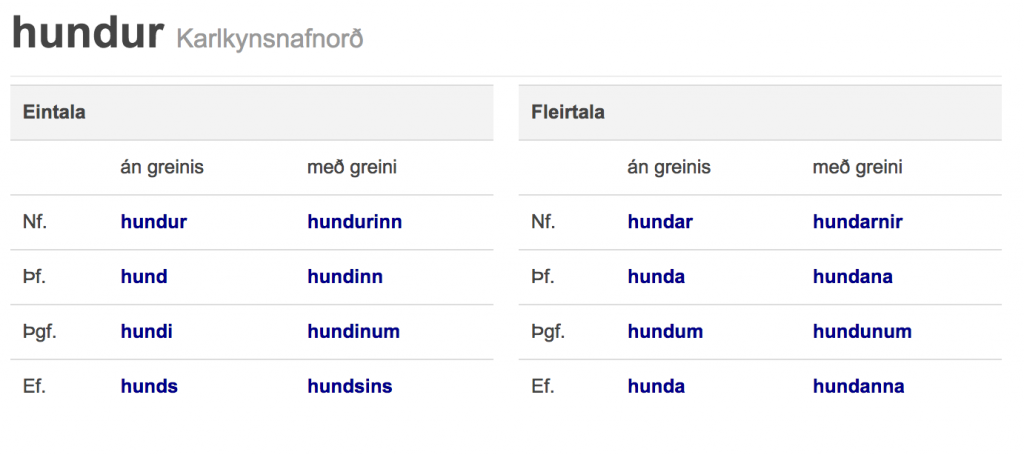Making Up Words: Let’s Talk Compounds Posted by Meg on May 15, 2017 in Icelandic grammar, Uncategorized
In my experience, Icelandic has no especial proclivity for succinctity, but it does have some words and phrases that are executed so elegantly that they work like swift brush strokes in a sentence. And compound words are in many cases the key to this eloquence through brevity.
Plus, you can use the to your advantage when you don’t know the word for something. Remember my last post? Augnablikssamsetningar are words that you make up in the blink of an eye: instead of saying the whatchamacallit or whosawhatsit, it’s a tepokatöng – tea tong, or tea tongs, more grammatically. Even in this simple example, you can see that the contruction of compounds is special.
The term used for this type of compound is a samsett orð – your run-of-the-mill, everyday combination of two or more stems to make a word. Doghouse, windmill, fireman, which are hundakofi, vindmylla, and slökkviliðsmaður, respectively, in Icelandic.
There are three main categories of compound words: genitive singular, genitive plural, and stem compounds. A stem is a word with all of its branches – prefixes, infixes, and suffixes. These three types of compounds refer to the first word in the compound – or what I’ll refer to as, simple, the ‘first branch’ or fyrri liður. So we know that these endings are: -s/-a [M], -ar/ir/-u [F], -s/-a [N].
So lets break them down.
Hundakofi is called a genitive plural compound word. A quick peek at the declension of hundur will tell us why:
 As you can see, hundur’s genitive plural ending is –a (nna). It’s a simple as that. And since we also know that the genitive plural of all nouns is gonna be –a (nna) or some slight variation (e.g., as in auga: augnanna), it’s reasonably easy to define which for the compound will take. Tips & tricks? Think about what the word means. In this case, it’s a house for dogs, perhaps individually intended for a single dog, but not consigned to a life with a single dog.
As you can see, hundur’s genitive plural ending is –a (nna). It’s a simple as that. And since we also know that the genitive plural of all nouns is gonna be –a (nna) or some slight variation (e.g., as in auga: augnanna), it’s reasonably easy to define which for the compound will take. Tips & tricks? Think about what the word means. In this case, it’s a house for dogs, perhaps individually intended for a single dog, but not consigned to a life with a single dog.
Similiarly, fiskabúr is a tank for fish plural. J The fishes tank, though you might only keep your prize goldfish.
Slökkviliðsmaður is a fireman, and it is a genitive singular samsett orð. The first branch is slökkvilið – or fire assistance – and the second branch is, of course, maður, as we see in many occupations. Slökkvilið itself is a is a neuter noun – a stem as opposed to a root – and can be broken down further into slökkvi and lið, with slökkva as the most likely root. Slökkvi is simply the ‘first branch’ which occurs in multiple words to do with fire rescue.
So we can intuit that slökkviliðs – singular – is fire assistance or help, which are often conveyed in the singular (fire assistances or fire helps?). And then we tag on maður, and bam! A word is born.
Vindmylla is of the third type. It’s a stem-compound, derived from the masculine noun vindur, or wind, and mylla, or mill. We’ve simply lopped off the declension ending (i.e., the indefinite article (hund/ur; peys/a; stein/n.
I have not, for my part, noticed many consistencies in the way compound words are made, but I hope that the rule of thumb ‘it probably makes sense’ rule is helpful. There’s one final component I’d like to address before signing off.
Tengistafssamsetning, or bandstafssamsetning, are compound words created with the addition of a letter that’s inserted between the first and second branches of compound words. They’re, generally, -r, -s, -a, -i, and –u. Some examples:
Landareign (landa+r+eign) – property, land. Land doesn’t have an –r- in its singular genitive or its plural genitive form, but it one has been inserted here, perhaps as a matter of phonology (it’s easier to say landareign than landaeign). I think the use of the genitive plural of land is a certainly an instance of the cultural mindset of at a historical moment: at the heart of this word is the question, how big is a landareign exactly?
A few further examples: : fimmtudagur, sendibréf, sippuband, dótabúð.
And if you’re feeling derivative, this month, I’ll also be posting about derivatives, or afleitt orð.
M

Build vocabulary, practice pronunciation, and more with Transparent Language Online. Available anytime, anywhere, on any device.



